Heart Blockage - Sings and Symptoms
A healthy heart beats 60-100 times per minute. Normally, every muscle contraction of the heart is controlled by electrical signals that travel from the heart’s upper chambers to the lower ones. A heart blockage disrupts the flow of electrical signals of the heart.
Heart blockage is partial when the electrical impulses are stopped or delayed, preventing the heart from beating regularly. A complete blockage, on the other hand, occurs when the electrical signals come to a halt completely. In this case, the heart rate drops below 40 bpm.
Many times, a heart block makes it harder for the heart to pump blood through the circulatory system, so the organs and muscles, including your brain, do not receive an adequate supply of oxygen to function properly.
Types of heart blockage and associated symptoms
Depending on the type of heart blockage, a person may encounter the following signs –
-
First-degree blockage – This is the least fatal type of heart blockage. Symptoms include minor disruptions in heartbeat or skipped beats.
-
Second-degree blockage – This occurs when some of the electrical signals do not reach the heart. Signs may include skipped or dropped beats, and dizziness.
-
Third-degree blockage – This is the most serious of all heart blockage conditions. This happens when the electrical signals do not travel between the lower and upper chambers of your heart. Most patients require a pacemaker for this condition. Without it, you may be at risk of a heart attack.
You should also watch out for these signs –
-
Heart palpitations – irregular or slow heartbeat
-
Shortness of breath
-
Discomfort or pain in the chest
-
Fainting and lightheadedness
-
Trouble exercising due to lack of blood being pumped through the body
Often, people with a blocked heart appear healthy from the outside, but they might be suffering from an underlying heart ailment.
Risk factors
Certain conditions, such as those mentioned below may put you at greater risk of a heart blockage –
-
Cardiomyopathy
-
Coronary thrombosis
-
Inflammation of the heart muscle – myocarditis
-
Inflammation of the heart valves – endocarditis
-
Scarring of the heart tissue
-
Family history of heart disorders
If you experience the above symptoms or have any of the above-mentioned conditions, you should visit a specialist and get yourself diagnosed immediately. Proper diagnosis at the earliest may help you receive appropriate treatment right away.
RELATED ISSUES
RELATED SPECIALITIES
Ask a free question
Get FREE multiple opinions from Doctors


+1.svg)
